Recent Events and Activities
Our first conference was a huge success!
Leopold and Agriculture Conference
Resilience and Sustainability in Working Landscapes
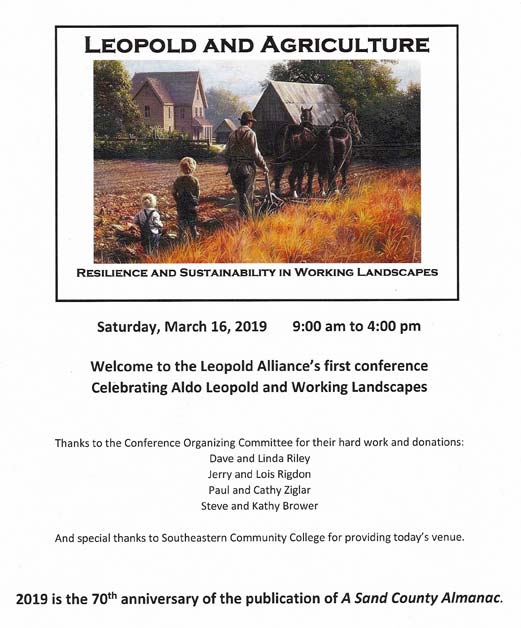
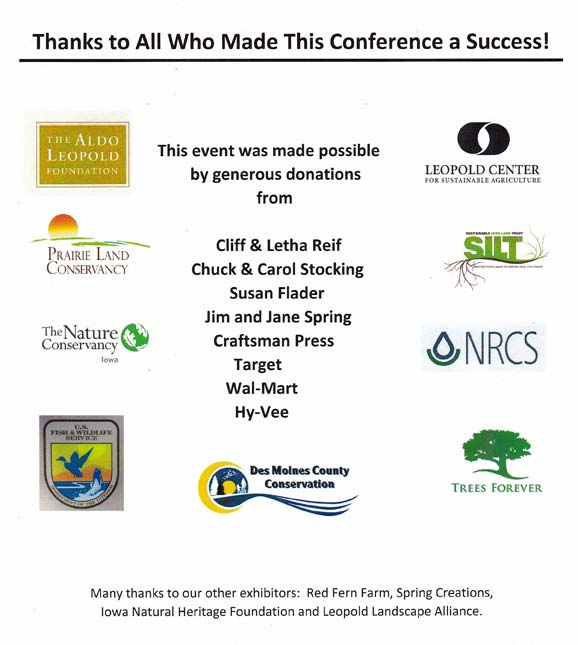
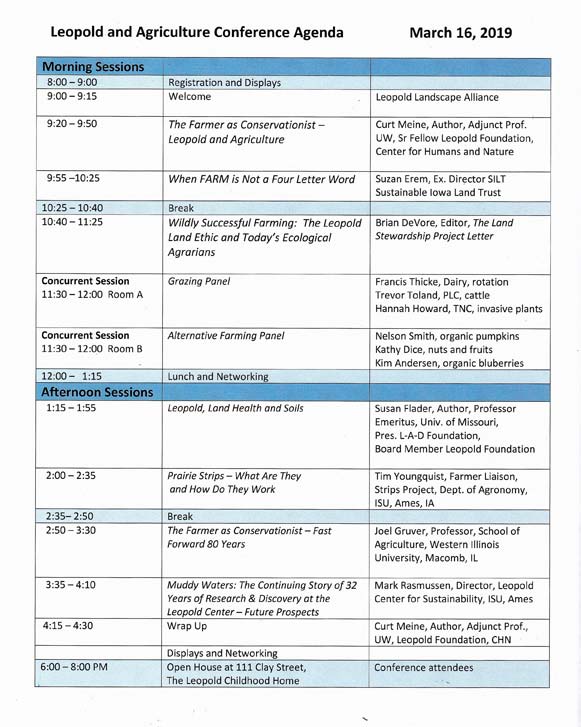
HIGHLIGHTS OF SPEAKERS' TALKS
The Leopold and Agriculture Conference at Southeast Community College was a great success! Here is a sampling of what our experienced speakers had to say.
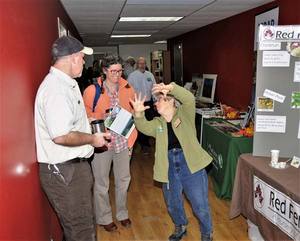
Kathy Dice from Red Fern Farm entertains in the Exhibitors Hall about growing nuts, with Ron Knopik of Fish and Wildlife Service, and Laura Semken with the University of Iowa Raptor Project, while Steve cruises the exhibits.
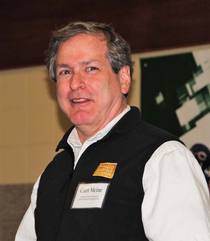
Curt Meine, Adjunct Prof. U of WI, Sr. Fellow Leopold Foundation & The Center for Humans and Nature, and author. Curt kicked started the sessions by speaking on "The Farmer as Conservationist--Leopold and Agriculture". Then he concluded the day with a round up of key ideas and phrases from the conclave of speakers.
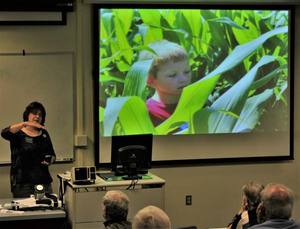 Suzan Erem, Ex. Director of the Sustainable Iowa Land Trust (SILT) named her talk "When FARM is not a Four Letter Word." SILT works to put young farmers back on affordable land and advises land owners about naturally suitable crops and management for their terrain.
Suzan Erem, Ex. Director of the Sustainable Iowa Land Trust (SILT) named her talk "When FARM is not a Four Letter Word." SILT works to put young farmers back on affordable land and advises land owners about naturally suitable crops and management for their terrain.
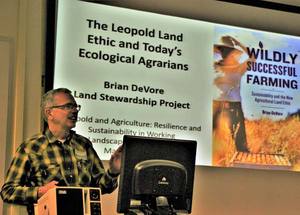 Brian DeVore, Editor of the Land Stewardship Project Letter, talked about his new book, "Wildly Successful Farming". For 25 years Brian has sought out farmers and land managers who have succeeded with regenerative methods to improve water quality, soils, wildlife, landscapes, and rural communities.
Brian DeVore, Editor of the Land Stewardship Project Letter, talked about his new book, "Wildly Successful Farming". For 25 years Brian has sought out farmers and land managers who have succeeded with regenerative methods to improve water quality, soils, wildlife, landscapes, and rural communities.
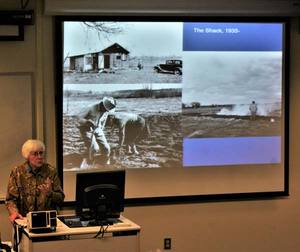 Susan Flader, author, Prof Emeritus U of Missouri in Environmental History, now President, L-A-D Foundation, Board Member Aldo Leopold Foundation, spoke on "Leopold, Land Health and Soils". Susan charged into the afternoon by taking us back to the beginnings of Aldo's belief that the soil is a living organism. An extraordinary evolution of thought well advanced for the time.
Susan Flader, author, Prof Emeritus U of Missouri in Environmental History, now President, L-A-D Foundation, Board Member Aldo Leopold Foundation, spoke on "Leopold, Land Health and Soils". Susan charged into the afternoon by taking us back to the beginnings of Aldo's belief that the soil is a living organism. An extraordinary evolution of thought well advanced for the time.
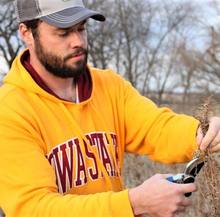 Tim Youngquist, the Farmer Liaison for the Strips Project in the Department of Agronomy, ISU Ames, talked about "Prairie Strips -- What Are They and How Do They Work". Tim helps farmers in the Midwest implement in-field buffer strips with prairie species to reduce erosion, filter chemical from fields, improve water quality, and increase wildlife habitat too!
Tim Youngquist, the Farmer Liaison for the Strips Project in the Department of Agronomy, ISU Ames, talked about "Prairie Strips -- What Are They and How Do They Work". Tim helps farmers in the Midwest implement in-field buffer strips with prairie species to reduce erosion, filter chemical from fields, improve water quality, and increase wildlife habitat too!
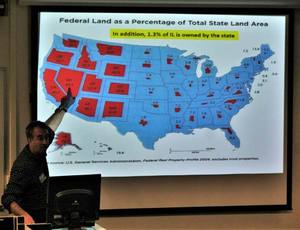 Joel Gruver is Professor of Agriculture at Western Illinois University in Macomb, IL and is Director of the WIU Organic Research Program. Joel uses Leopold as a regular guide for his agriculture and open space classes. In "The Farmer as Conservationist--Fast Forward 80 Years" he provided many clues to how we can be better stewards of the land, especially in the Midwest where most land is privately owned.
Joel Gruver is Professor of Agriculture at Western Illinois University in Macomb, IL and is Director of the WIU Organic Research Program. Joel uses Leopold as a regular guide for his agriculture and open space classes. In "The Farmer as Conservationist--Fast Forward 80 Years" he provided many clues to how we can be better stewards of the land, especially in the Midwest where most land is privately owned.
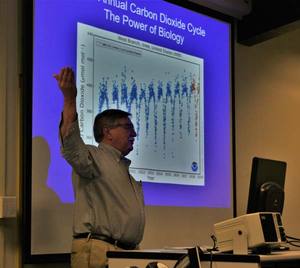 Mark Rasmussen is the Director of the Leopold Center for Sustainable Agriculture at ISU, Ames. "Muddy Waters: The Continuing Story of 32 Years of Research & Discovery at the Leopold Center--Future Prospects" gave us insights on how LCSA has guided agricultural research in diverse fields from buffer strips to climate change and carbon sequestration.
Mark Rasmussen is the Director of the Leopold Center for Sustainable Agriculture at ISU, Ames. "Muddy Waters: The Continuing Story of 32 Years of Research & Discovery at the Leopold Center--Future Prospects" gave us insights on how LCSA has guided agricultural research in diverse fields from buffer strips to climate change and carbon sequestration.
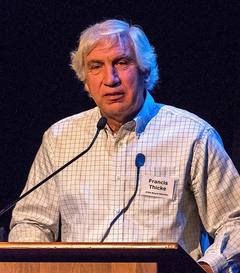 Francis Thicke lead the Grazing Panel with examples of practical ideas implemented at the "Radiance Dairy" he owns and operates near Fairfield, Iowa. His rotational grazing practices have encouraged many to adopt this more natural pattern of moving animals through the landscape. His organic dairy not only produces milk for the local groceries and restaurants, but also is a popular ice cream stop on RAGBRAI bike rides across Iowa.
Francis Thicke lead the Grazing Panel with examples of practical ideas implemented at the "Radiance Dairy" he owns and operates near Fairfield, Iowa. His rotational grazing practices have encouraged many to adopt this more natural pattern of moving animals through the landscape. His organic dairy not only produces milk for the local groceries and restaurants, but also is a popular ice cream stop on RAGBRAI bike rides across Iowa.
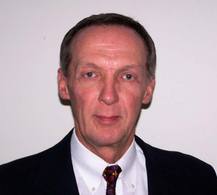 Trevor Toland, also on the Grazing Panel is Chair of the Prairie Land Conservancy in Macomb, Il. His River Oak Ranch near Macomb operates 250 acres of grazing divided into 50 paddocks. Trevor's cattle ranch is visited by classes and farm groups to learn about adaptive management grazing. Trevor talked about his work with cattle, timber and more.
Trevor Toland, also on the Grazing Panel is Chair of the Prairie Land Conservancy in Macomb, Il. His River Oak Ranch near Macomb operates 250 acres of grazing divided into 50 paddocks. Trevor's cattle ranch is visited by classes and farm groups to learn about adaptive management grazing. Trevor talked about his work with cattle, timber and more.
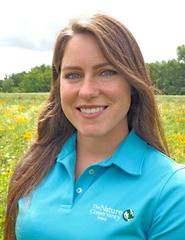 Hannah Howard, also on the Grazing Panel focused on the problem of invasive species in woodlands and prairies. Goat grazing & browse in woodlands has proven an effective way to control invasive shrubs and weed trees. Cattle grazing in Reeds Canary Grass gives hope for reducing its impacts on bottomlands and swales in the Swamp White Oak Preserve near Conesville, IA. Hannah is the Community Coordinator for The Nature Conservancy in Muscatine County, IA.
Hannah Howard, also on the Grazing Panel focused on the problem of invasive species in woodlands and prairies. Goat grazing & browse in woodlands has proven an effective way to control invasive shrubs and weed trees. Cattle grazing in Reeds Canary Grass gives hope for reducing its impacts on bottomlands and swales in the Swamp White Oak Preserve near Conesville, IA. Hannah is the Community Coordinator for The Nature Conservancy in Muscatine County, IA.
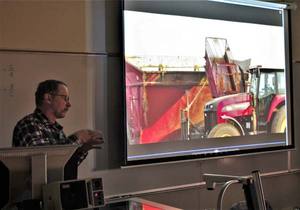 Nelson (Leopold) Smith lead the Alternative Farming Panel with a discussion on raising organic pumpkins as a switch from usual row crops. His family's Springtown Ranch near Brighton, IA has been certified organic since 1997 and implements a 6 crop rotation system, and non-chemical herbaceous weed control. They also participate in the North Central Sustainable Ag Research program. Nelson is Aldo's grand-nephew.
Nelson (Leopold) Smith lead the Alternative Farming Panel with a discussion on raising organic pumpkins as a switch from usual row crops. His family's Springtown Ranch near Brighton, IA has been certified organic since 1997 and implements a 6 crop rotation system, and non-chemical herbaceous weed control. They also participate in the North Central Sustainable Ag Research program. Nelson is Aldo's grand-nephew.
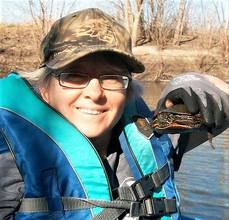 Kathy Dice (along with husband Tom Wahl) showed how their Red Fern Farm succeeds in growing nuts and fruits as a profitable alternative to row crops. Chestnuts, hazelnuts, paw paws and heartnuts are just a few crops in addition the typical 'apples & walnuts'. She delights in explaining how much joy they have farming and relief that customers harvest the crop!
Kathy Dice (along with husband Tom Wahl) showed how their Red Fern Farm succeeds in growing nuts and fruits as a profitable alternative to row crops. Chestnuts, hazelnuts, paw paws and heartnuts are just a few crops in addition the typical 'apples & walnuts'. She delights in explaining how much joy they have farming and relief that customers harvest the crop!
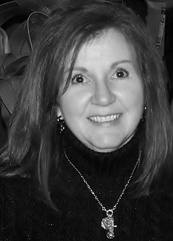 Kim Anderson (and husband Steve) added to the Alternative Farming Panel by sharing her experiences establishing blueberries on the family farm near Brighton, IA. Amending the soil, planning layout, and certifying organic for their U-pick operation has taken 5 years. With great joy, Blueberry Bottom Farm will open its first U-pick this summer.
Kim Anderson (and husband Steve) added to the Alternative Farming Panel by sharing her experiences establishing blueberries on the family farm near Brighton, IA. Amending the soil, planning layout, and certifying organic for their U-pick operation has taken 5 years. With great joy, Blueberry Bottom Farm will open its first U-pick this summer.
More detailed information about our speakers is below:
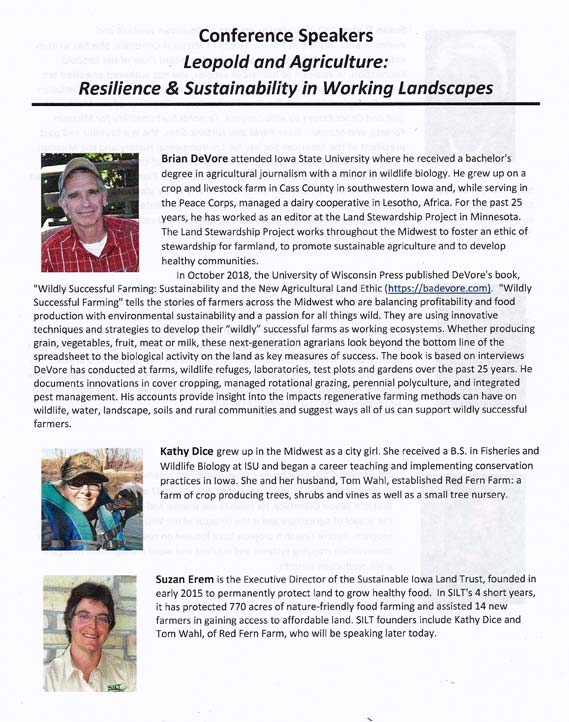
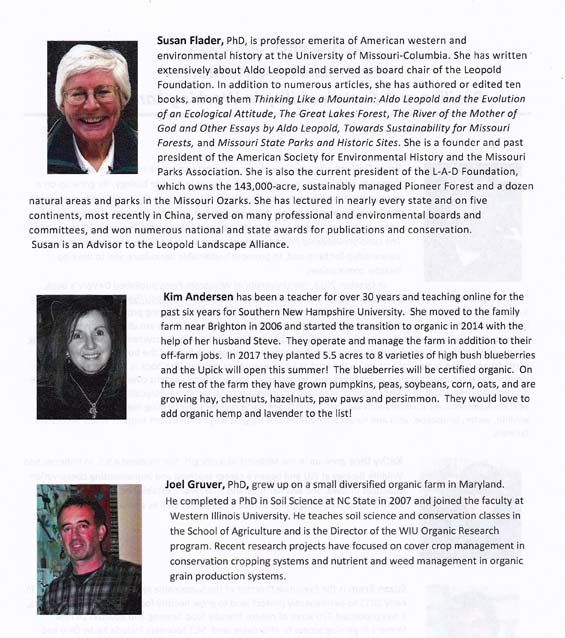
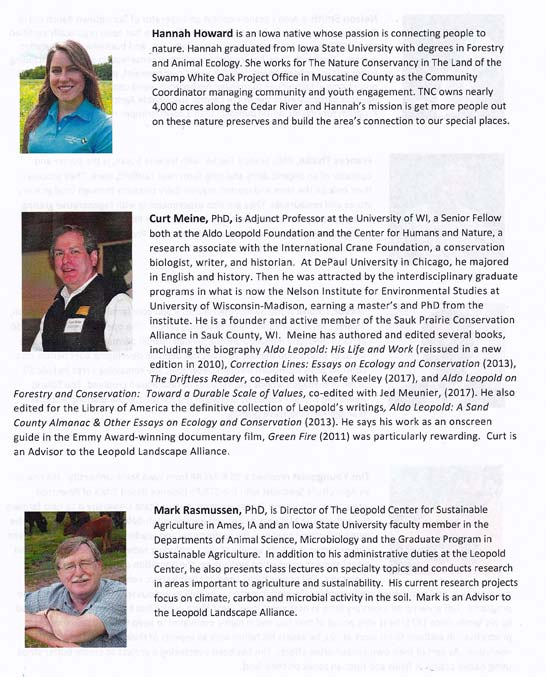
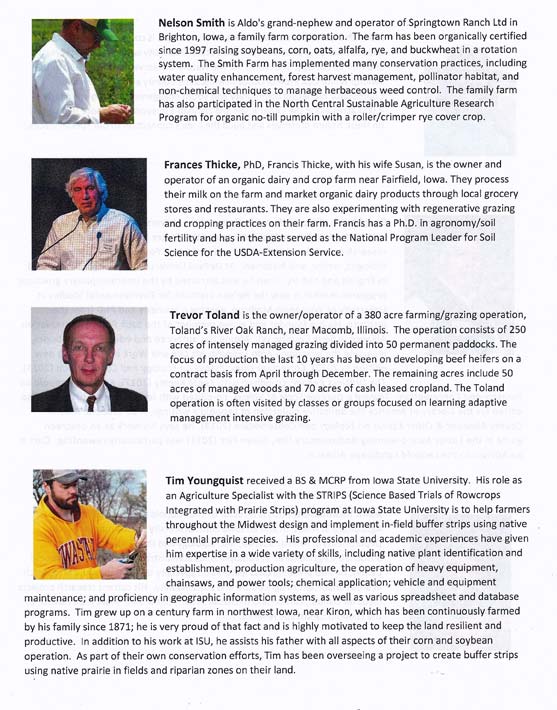
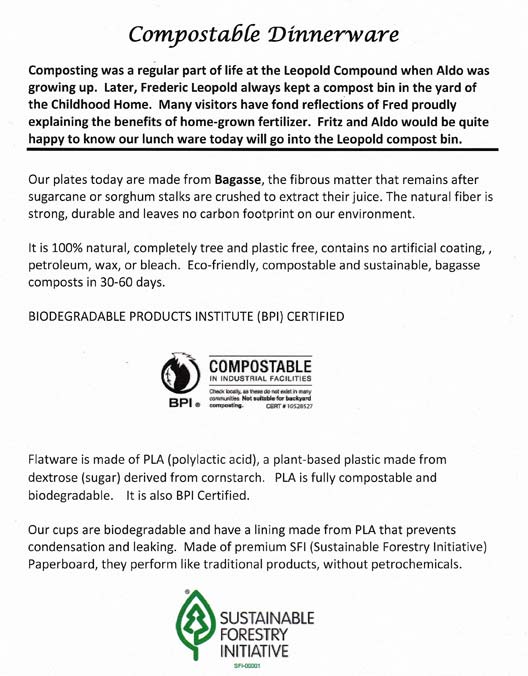



 Suzan Erem, Ex. Director of the Sustainable Iowa Land Trust (SILT) named her talk "When FARM is not a Four Letter Word." SILT works to put young farmers back on affordable land and advises land owners about naturally suitable crops and management for their terrain.
Suzan Erem, Ex. Director of the Sustainable Iowa Land Trust (SILT) named her talk "When FARM is not a Four Letter Word." SILT works to put young farmers back on affordable land and advises land owners about naturally suitable crops and management for their terrain. Brian DeVore, Editor of the Land Stewardship Project Letter, talked about his new book, "Wildly Successful Farming". For 25 years Brian has sought out farmers and land managers who have succeeded with regenerative methods to improve water quality, soils, wildlife, landscapes, and rural communities.
Brian DeVore, Editor of the Land Stewardship Project Letter, talked about his new book, "Wildly Successful Farming". For 25 years Brian has sought out farmers and land managers who have succeeded with regenerative methods to improve water quality, soils, wildlife, landscapes, and rural communities. Susan Flader, author, Prof Emeritus U of Missouri in Environmental History, now President, L-A-D Foundation, Board Member Aldo Leopold Foundation, spoke on "Leopold, Land Health and Soils". Susan charged into the afternoon by taking us back to the beginnings of Aldo's belief that the soil is a living organism. An extraordinary evolution of thought well advanced for the time.
Susan Flader, author, Prof Emeritus U of Missouri in Environmental History, now President, L-A-D Foundation, Board Member Aldo Leopold Foundation, spoke on "Leopold, Land Health and Soils". Susan charged into the afternoon by taking us back to the beginnings of Aldo's belief that the soil is a living organism. An extraordinary evolution of thought well advanced for the time. Tim Youngquist, the Farmer Liaison for the Strips Project in the Department of Agronomy, ISU Ames, talked about "Prairie Strips -- What Are They and How Do They Work". Tim helps farmers in the Midwest implement in-field buffer strips with prairie species to reduce erosion, filter chemical from fields, improve water quality, and increase wildlife habitat too!
Tim Youngquist, the Farmer Liaison for the Strips Project in the Department of Agronomy, ISU Ames, talked about "Prairie Strips -- What Are They and How Do They Work". Tim helps farmers in the Midwest implement in-field buffer strips with prairie species to reduce erosion, filter chemical from fields, improve water quality, and increase wildlife habitat too! Joel Gruver is Professor of Agriculture at Western Illinois University in Macomb, IL and is Director of the WIU Organic Research Program. Joel uses Leopold as a regular guide for his agriculture and open space classes. In "The Farmer as Conservationist--Fast Forward 80 Years" he provided many clues to how we can be better stewards of the land, especially in the Midwest where most land is privately owned.
Joel Gruver is Professor of Agriculture at Western Illinois University in Macomb, IL and is Director of the WIU Organic Research Program. Joel uses Leopold as a regular guide for his agriculture and open space classes. In "The Farmer as Conservationist--Fast Forward 80 Years" he provided many clues to how we can be better stewards of the land, especially in the Midwest where most land is privately owned. Mark Rasmussen is the Director of the Leopold Center for Sustainable Agriculture at ISU, Ames. "Muddy Waters: The Continuing Story of 32 Years of Research & Discovery at the Leopold Center--Future Prospects" gave us insights on how LCSA has guided agricultural research in diverse fields from buffer strips to climate change and carbon sequestration.
Mark Rasmussen is the Director of the Leopold Center for Sustainable Agriculture at ISU, Ames. "Muddy Waters: The Continuing Story of 32 Years of Research & Discovery at the Leopold Center--Future Prospects" gave us insights on how LCSA has guided agricultural research in diverse fields from buffer strips to climate change and carbon sequestration. Francis Thicke lead the Grazing Panel with examples of practical ideas implemented at the "Radiance Dairy" he owns and operates near Fairfield, Iowa. His rotational grazing practices have encouraged many to adopt this more natural pattern of moving animals through the landscape. His organic dairy not only produces milk for the local groceries and restaurants, but also is a popular ice cream stop on RAGBRAI bike rides across Iowa.
Francis Thicke lead the Grazing Panel with examples of practical ideas implemented at the "Radiance Dairy" he owns and operates near Fairfield, Iowa. His rotational grazing practices have encouraged many to adopt this more natural pattern of moving animals through the landscape. His organic dairy not only produces milk for the local groceries and restaurants, but also is a popular ice cream stop on RAGBRAI bike rides across Iowa. Trevor Toland, also on the Grazing Panel is Chair of the Prairie Land Conservancy in Macomb, Il. His River Oak Ranch near Macomb operates 250 acres of grazing divided into 50 paddocks. Trevor's cattle ranch is visited by classes and farm groups to learn about adaptive management grazing. Trevor talked about his work with cattle, timber and more.
Trevor Toland, also on the Grazing Panel is Chair of the Prairie Land Conservancy in Macomb, Il. His River Oak Ranch near Macomb operates 250 acres of grazing divided into 50 paddocks. Trevor's cattle ranch is visited by classes and farm groups to learn about adaptive management grazing. Trevor talked about his work with cattle, timber and more. Hannah Howard, also on the Grazing Panel focused on the problem of invasive species in woodlands and prairies. Goat grazing & browse in woodlands has proven an effective way to control invasive shrubs and weed trees. Cattle grazing in Reeds Canary Grass gives hope for reducing its impacts on bottomlands and swales in the Swamp White Oak Preserve near Conesville, IA. Hannah is the Community Coordinator for The Nature Conservancy in Muscatine County, IA.
Hannah Howard, also on the Grazing Panel focused on the problem of invasive species in woodlands and prairies. Goat grazing & browse in woodlands has proven an effective way to control invasive shrubs and weed trees. Cattle grazing in Reeds Canary Grass gives hope for reducing its impacts on bottomlands and swales in the Swamp White Oak Preserve near Conesville, IA. Hannah is the Community Coordinator for The Nature Conservancy in Muscatine County, IA. Nelson (Leopold) Smith lead the Alternative Farming Panel with a discussion on raising organic pumpkins as a switch from usual row crops. His family's Springtown Ranch near Brighton, IA has been certified organic since 1997 and implements a 6 crop rotation system, and non-chemical herbaceous weed control. They also participate in the North Central Sustainable Ag Research program. Nelson is Aldo's grand-nephew.
Nelson (Leopold) Smith lead the Alternative Farming Panel with a discussion on raising organic pumpkins as a switch from usual row crops. His family's Springtown Ranch near Brighton, IA has been certified organic since 1997 and implements a 6 crop rotation system, and non-chemical herbaceous weed control. They also participate in the North Central Sustainable Ag Research program. Nelson is Aldo's grand-nephew. Kathy Dice (along with husband Tom Wahl) showed how their Red Fern Farm succeeds in growing nuts and fruits as a profitable alternative to row crops. Chestnuts, hazelnuts, paw paws and heartnuts are just a few crops in addition the typical 'apples & walnuts'. She delights in explaining how much joy they have farming and relief that customers harvest the crop!
Kathy Dice (along with husband Tom Wahl) showed how their Red Fern Farm succeeds in growing nuts and fruits as a profitable alternative to row crops. Chestnuts, hazelnuts, paw paws and heartnuts are just a few crops in addition the typical 'apples & walnuts'. She delights in explaining how much joy they have farming and relief that customers harvest the crop! Kim Anderson (and husband Steve) added to the Alternative Farming Panel by sharing her experiences establishing blueberries on the family farm near Brighton, IA. Amending the soil, planning layout, and certifying organic for their U-pick operation has taken 5 years. With great joy, Blueberry Bottom Farm will open its first U-pick this summer.
Kim Anderson (and husband Steve) added to the Alternative Farming Panel by sharing her experiences establishing blueberries on the family farm near Brighton, IA. Amending the soil, planning layout, and certifying organic for their U-pick operation has taken 5 years. With great joy, Blueberry Bottom Farm will open its first U-pick this summer.





